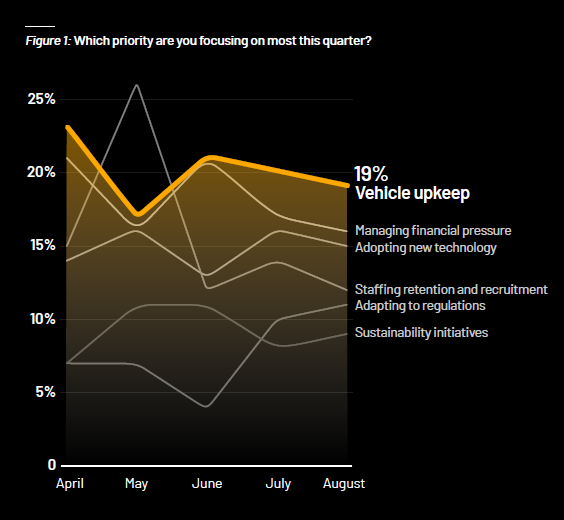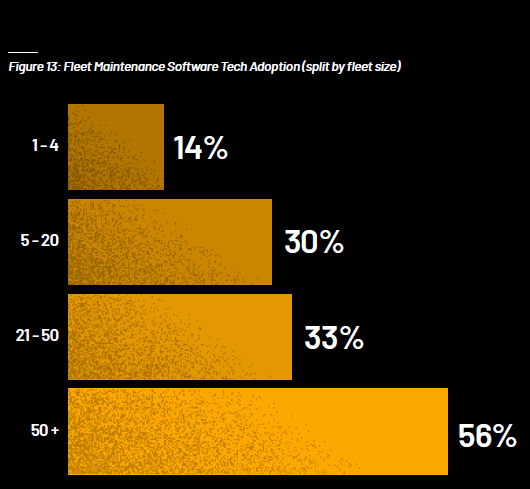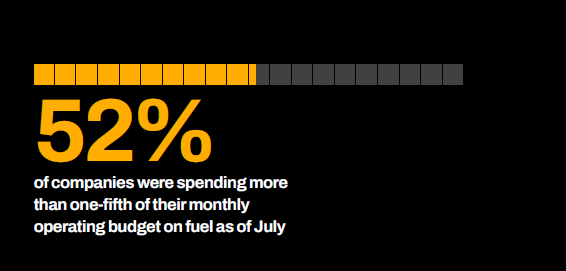In 2025, managing costs is one of the top priorities for logistics businesses across the country. With the reality of tariffs biting, freight firms are under pressure to make every cent count.
But how, exactly, are they dealing with this economic uncertainty? Over the course of four months, we gathered over 1,500 responses from industry professionals to find out exactly that. Their thoughts form this latest report, Managing Costs in Logistics.
Hit the download button below to get the latest insight.
Managing Costs in Logistics 2025 Report: Key Takeaways
Below, you’ll find a selection of key takeaways to give you a flavor of what you can expect from the full report. Take a look, and be sure to download the free report to learn more about where the logistics sector is headed in 2025.
- Across four of the last five months, approximately 20% of logistics professionals cited “vehicle upkeep” as their biggest priority of the fiscal quarter.
- Just 14% of firms with one-to-four vehicles have adopted fleet maintenance software, compared with 56% of firms with 50+ vehicles.
- 52% of respondents were spending more than one-fifth of their monthly operating budget on fuel, as of July.
Vehicle Upkeep Is Top of Mind for Professionals Everywhere
Firms are conscious that longevity of assets is inextricably tied to their own survival and that’s why vehicle upkeep is the biggest cost consideration of logistics businesses across the US, according to our research.
It’s not hard to see why. If successful preventative maintenance keeps a semi-truck on the road for 15 years, instead of the 10 that was estimated upon purchasing, then its lifetime value has increased by 50%.

The Cost Issue for Smaller Companies
With vehicle maintenance becoming more important, smaller firms are feeling the pinch. Our research shows that it is largely logistics businesses with more than 50 vehicles that are adopting fleet maintenance software. Micro-firms with one-to-four vehicles are much less likely to find room in the budget.

The Impact of the Rising Cost of Fuel
Due to a combination of global socio-economic factors, including tariffs and crude oil supply, the cost of diesel is rising. This spells trouble for freight firms everywhere.
Our research shows that rising fuel costs are a top priority for businesses in 2025 — ahead of the likes of “major unforeseen disruptions,” “workforce shortages,” and more.
Rising Fuel Costs in 2025
The cost of fuel is baked into the cost of service. If those costs change, so does the cost of the job. With diesel volatility, driver wages rising, and parts costs climbing, carriers are tightening fuel efficiency targets, locking in bulk fuel agreements, and using real-time telematics to spot maintenance issues before they become service disruptions.

The Role of Tech in Cost Management
The solution to logistics businesses’ budgetary woes? Technology may not yet be a silver bullet, but it certainly provides some compelling answers to questions that have plagued the sector in 2025.
While a lot of firms only began to invest in new and innovative technologies as a response to regulatory mandates, many are now enjoying the benefits of driver monitoring and coaching platforms, route optimization software, and more.
And, when you can make critical savings to offset the rising cost of fuel, who wouldn’t embrace technology?

Tech.co: Who Are We and Where Did This Report Come From?
Tech.co is a global media brand with a focus on B2B technology. We cover a broad range of business technologies, from white collar solutions like website builders, project management tools, or CRM platforms, to blue collar tech solutions like field service, asset tracking, and fleet management.
For our most recent project — a series of seven reports covering the key dynamics of the logistics sector across most of 2025 so far — we opted for multi-faceted in-depth research that combined three core data sources.
First, we included the results from a pulse tracker survey we’ve been running every month since April 2025. Our 1,582 responses include logistics professionals, from ground-level staffers to senior management.
Second, we used our BenchmarkMe Survey data, which tracked 840 responses from purchase-decision makers discussing their technology priorities.
Finally, we conducted direct interviews with a selection of industry leaders, for added context.
Download our full Managing Costs in Logistics report here to get a complete look at the valuable insights we found.